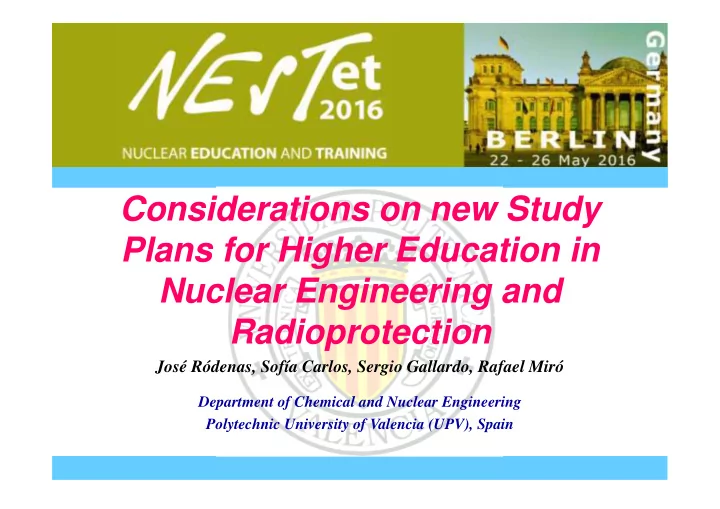

Considerations on new Study Plans for Higher Education in Nuclear Engineering and Radioprotection José Ródenas, Sofía Carlos, Sergio Gallardo, Rafael Miró Department of Chemical and Nuclear Engineering Polytechnic University of Valencia (UPV), Spain
CONTENTS Introduction Present situation New Study Plans at UPV Possible solutions Methodology Conclusions 2
INTRODUCTION Many countries introduced important changes in curricula of Universities and other Higher Education Institutions. Study Plans on Nuclear Engineering and Radioprotection have been also widely modified. Changes affect students going through nuclear courses. It is necessary to encourage new generations to choose the nuclear option. Active learning methodology is recommended to improve the formation of students. The general situation and particular features of nuclear related courses are analysed. In particular at UPV. Some solutions are proposed. 3
PRESENT SITUATION External factors can influence on the decision of new generations of students about the nuclear option. Negative impact on the public opinion of nuclear energy. Well accepted in medical, but not for energy production. Impact of accidents: Chernobyl, Fukushima. Developing of nuclear sector depends on economy planning and other factors in each country Nuclear engineers and scientists going to retirement. A good program for nuclear matters in universities is essential as well as a planning of education and training in companies working in the nuclear sector. 4
NEW STUDY PLANS AT UPV GENERAL FEATURES 14 Bachelor level degrees and 9 Master degrees. Not all of them have Engineer professional attributions. Degree diploma (4 years, 240 ECTS) + Degree Thesis. Master (2 years, 120 ECTS) + Master Thesis. Different specializations with too many optional courses. A high increase in the number of offered courses. An almost completely free choice of optional courses. Difficult organization of lecture timetable negative impact on the schedule of students and professors. Studies on Nuclear Engineering and Radioprotection become also affected by these changes. 5
NEW STUDY PLANS AT UPV NUCLEAR RELATED COURSES 4 th year Energy Engineer Degree (GIE) Nuclear Technology (1 st semester) Advanced Nuclear Plants (2 nd semester) Reactor Operation (2 nd semester) Radiological Protection (2 nd semester) Nuclear Safety (2 nd semester) 2 nd year Industrial Engineer Master (MII) Nuclear Energy and radiations (1 st semester) Radiological Protection in Radioactive and Nuclear Installations (2 nd ) Really, GIE and MII are independent studies. The analysis is centered on GIE. 6
NEW STUDY PLANS AT UPV NUCLEAR RELATED COURSES A student of 4 th GIE usually chooses 1-2 optional courses (rarely all of them). Consequences: The formation of GIE students becomes incomplete in the nuclear field. A decrease in the number of students per course. With the choice of courses completely free, formation of students on nuclear fields is apparently not improved. An optimal curriculum on Nuclear Science and Technology cannot be easily configured. It is necessary a Nuclear Energy Master or an Energy Master, more general, including a nuclear option. 7
POSSIBLE SOLUTIONS It is not good the dispersion of attention on non-related subjects for the education from a global point of view and also for the formation in the nuclear field. A well-structured planning for Energy Engineer Degree with specific Master on Nuclear Engineering is required. Introductory and basic courses at Bachelor level. Specific and specialized courses at Master level. This probably could help to have good engineers and scientists in nuclear fields. The teaching methodology applied may also have a positive impact on the learning process as well as on the disposition of students to choose the nuclear option. 8
METHODOLOGY The use of an active learning methodology is highly recommended as it can improve formation of students. However, the active methodology is not just to increase the number of exams and to program in all details the activity to be developed by students. Students are the active subject of their own learning. Professors should supervise and drive this process to optimise learning results. Involving students in the development of lessons. It is indispensable the personal motivation of students. To encourage students to actively participate in class by discussing each lesson, although they have no background in the field. 9
METHODOLOGY The objectives of each lesson are proposed by means of questions to stimulate the participation of students in the discussion. Questions addressed to obtain ideas from students not just to get answers read in a book. The best quality of professors should be to stimulate students. The best quality of students is to think and to work. Students must be previously provided with the information necessary to prepare the discussion. A text book is important. Notes, books, journals, bibliography, practical exercises, questions, software and web pages. 10
METHODOLOGY Preferable a continuous evaluation of students with… comprehensive understanding of basic concepts, application to practical cases, verifying the accomplishment of objectives. The development of individual projects with an oral presentation should be stressed. This active learning methodology becomes more difficult to apply when the number of students per course is increasing. E-learning (partial or total) can be an alternative, although direct contact teacher-student can be lost and it is important to keep active this contact as much as possible. 11
CONCLUSIONS New Study Plans for Higher Education in Nuclear Engineering and Radioprotection have a possible negative impact on the formation and training of engineers and scientists in nuclear fields. It would be convenient to decrease the optionality of courses to avoid the dispersion of the attention and to get a more complete formation of students. It seems necessary to establish a program of basic courses at Bachelor level for Energy engineers followed by a well-structured Master on Nuclear Engineering. 12
CONCLUSIONS An active learning methodology is recommended as it can improve the formation of students. The self-learning should be stimulated trying to maximize the thinking activity of students. A common action to improve the situation must be taken in three sectors: Institutions elaborating Study Plans. Universities developing and applying them. Companies involved in the nuclear sector through training. 13
14 Thank you for your attention
Recommend
More recommend